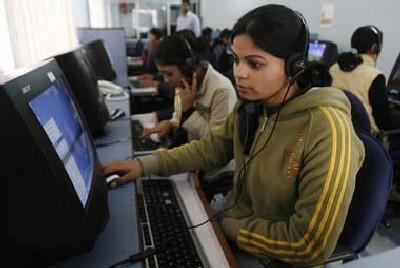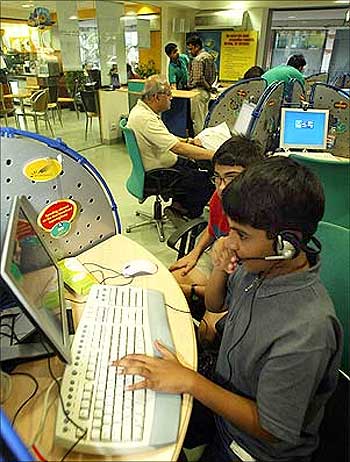Photographs: Reuters.
The Indian state has once again, over this week, shown its inability to grasp the essentials of new media and the internet.
In the poorly planned blocking of several websites and accounts on the social networks Twitter and Facebook, it has demonstrated not just the wrong instincts, but a wholesale lack of effectiveness.
This is more than just a free speech issue, though that is an important argument. But even if some restrictions on speech are to be temporarily imposed in a time of panic, what is the procedure with which they are chosen and imposed?
What is the oversight? And what is the intelligence capability informing their imposition? On all three counts, the government's recent blocks have shown unpreparedness and short-sightedness.
...
Why government's web censorship is faulty
Photographs: Reuters.
The list of blocked sites, for example. The Department of Telecommunications, according to a newspaper report, has written a series of letters to internet service providers, which are capable of driving to despair anyone who still believes in the government's competence to monitor and control the internet.
First of all, there's the question of procedure: what was the process by which these blocks were picked out? Was it just a single bureaucrat Googling away idly? The set of blocked links certainly suggest so.
Some are websites carrying hate speech and incitement, certainly. But many more are legitimate websites - such as YouTube or London's Daily Telegraph in which some keywords, possibly in the comments, have come up in whatever screening mechanism was used.
...
Why government's web censorship is faulty
Yet others are quite inexplicable, in that they are true and corrective accounts of what has happened, for example, to the Rohingyas in Myanmar - and, as such, should be widely dispersed in order to counter misinformation.
The random choice of Twitter accounts to block, too, reveals the lack of basic commonsense informing the DoT's actions.
The most likely explanation for which accounts were chosen is that they showed up in some search of keywords or pictures - but clearly, given that some well-known journalists' accounts were blocked, whatever process informed the choice was faulty.
And can such directives be just conveyed to ISPs in a letter, without any further due process?
...
Why government's web censorship is faulty
Photographs: Reuters.
Even the IT Act requires oversight by an examining committee for such blocks during an emergency. There should be a panel of officials from several ministries.
The government must answer as to whether this examining committee met before or after the block, and what its deliberations were. Were intelligence agencies involved? If so, which ones - and why more than one?
Such input should go, from whichever intelligence agencies are concerned, to the National Technical Research Organisation, which claims to have the capability to properly monitor the internet - and only thence to the DoT.
Otherwise there will be confusion, and back-channel communication, and errors of management.
...
Why government's web censorship is faulty
Most worryingly, in this case, the letters from the DoT clearly try to ensure there is no paper trail which would be subject to an RTI demand, telling ISPs that "compliance letters should not mention specific URLs".
This suggests that these inefficient bureaucrats are trying to escape proper scrutiny, and should be held accountable. Overall, this story has an important moral.
The Indian government clearly has no capability to control the internet without making a laughing stock of itself. It should learn its lesson and stop trying







article